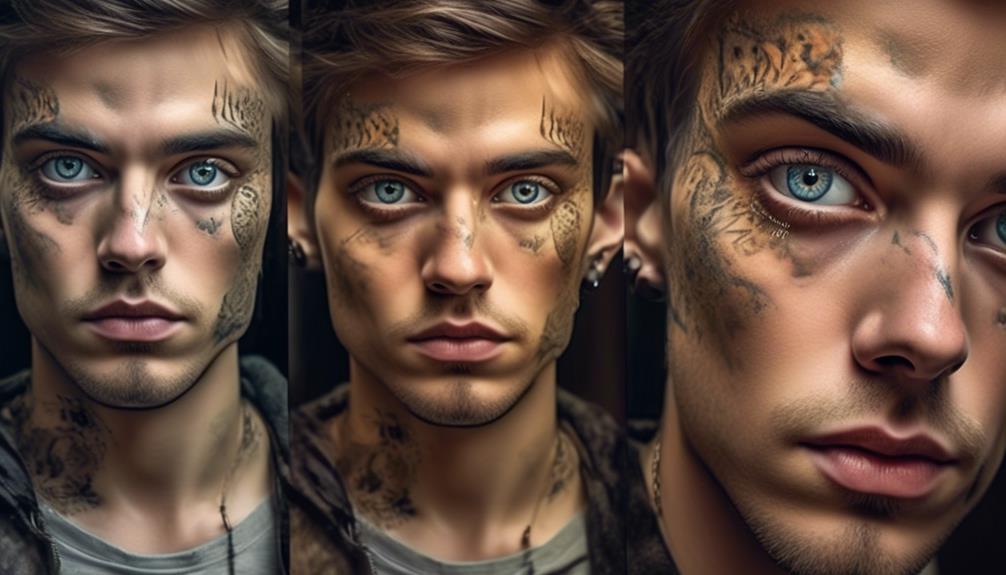As we navigate the intricate web of human relationships, one thing that can completely halt us in our tracks is the subtle gaze of a covert narcissist.
This chilling gaze, akin to a silent predator surveying its prey, holds a power that goes beyond mere eye contact. The intensity of this stare can be disconcerting, leaving one questioning its true intentions and impact.
In the following discussion, we will unravel the complexities surrounding this covert behavior, shedding light on its nuances and exploring strategies to navigate its unsettling presence.
Key Takeaways
- Covert narcissist stare is a manipulative tool used to control others.
- The stare instills fear, doubt, and submission in the narcissist's targets.
- It lacks warmth and empathy, exuding superiority and entitlement.
- The stare erodes self-esteem, creates insecurity, and impacts mental well-being.
Understanding Covert Narcissism Stare
When analyzing the behavior of individuals with covert narcissism, their stare serves as a subtle yet powerful tool in manipulating and controlling those around them. A Covert Narcissist's gaze isn't just a casual look; it's a calculated maneuver meant to instill fear, doubt, and submission in their targets.
This intense stare is often devoid of genuine warmth or empathy, instead exuding an air of superiority and entitlement. The covert nature of this behavior makes it challenging for others to pinpoint or confront, as it operates under the surface of social interactions.
The Covert Narcissist's stare is a manifestation of their need for control and validation. By locking eyes with their victim, they create a sense of unease and vulnerability, subtly asserting their dominance without uttering a single word.
This calculated tactic is designed to keep others off-balance and under the narcissist's influence. Understanding the power dynamics at play in these interactions is crucial for identifying and protecting oneself from the manipulative tactics of covert narcissists.
Identifying Covert Narcissist Gaze

Identifying the Covert Narcissist's gaze requires keen observation and an understanding of the subtle cues they use to assert control and dominance in social interactions. Covert narcissists often exhibit a distinct stare that may feel intense and unsettling to those on the receiving end. Their gaze is characterized by a sense of superiority and entitlement, which can be observed through the way they maintain prolonged eye contact while subtly evaluating others.
In addition to their stare, covert narcissists also utilize specific body language cues to convey their manipulative intentions. They may employ subtle gestures such as smirks, raised eyebrows, or micro-expressions of contempt to signal their feelings of superiority without overtly expressing them verbally. These non-verbal cues play a crucial role in their attempts to exert power and influence over others in a covert manner.
Effects of Covert Narcissist Stare
The Covert Narcissist's intense stare can have profound psychological effects on those who are subjected to it, influencing feelings of unease and powerlessness in social interactions. When experiencing the penetrating gaze of a covert narcissist, individuals often report a sense of being scrutinized and judged, even without any explicit words or actions. This intense stare can create a palpable tension, causing the recipient to question their own worth and competence.
Moreover, the covert narcissist's stare can leave lasting impacts on one's self-esteem and confidence. Being the target of such a gaze can instill a sense of insecurity and self-doubt, leading to heightened anxiety in social settings. The feeling of being under constant observation can erode one's sense of autonomy and agency, making it challenging to assert oneself or express opinions freely.
Strategies Against Covert Narcissist Stare

To effectively combat the intense stare of a covert narcissist, individuals must prioritize maintaining their emotional boundaries and asserting their worth.
When faced with the piercing gaze of a covert narcissist, it's crucial to remind oneself of personal value and not succumb to feelings of intimidation or manipulation. Practicing assertiveness is key; standing firm and refusing to yield to their attempts at dominance can help diminish the impact of their stare. Additionally, limiting or avoiding direct eye contact with the covert narcissist can help reduce the emotional strain and prevent them from exerting control.
Seeking support from trusted individuals such as friends, family, or a therapist is essential in navigating the manipulative tactics of a covert narcissist. Validation and guidance from a supportive network can aid in maintaining emotional resilience. Educating oneself about covert narcissism and its strategies is empowering; understanding their behaviors enables individuals to protect themselves and prioritize their well-being.
Impact of Covert Narcissist Stare
Understanding the psychological impact of a covert narcissist's stare can unveil the intricate dynamics at play in interpersonal interactions. When a covert narcissist employs their penetrating gaze, it can instill feelings of unease, self-doubt, and anxiety in their target. The intensity of the stare can make the recipient question their worth and competence, as if under a microscope of judgment. This can lead to a sense of being scrutinized or manipulated, fostering a subtle yet powerful form of control wielded by the covert narcissist.
The impact of the covert narcissist's stare goes beyond mere discomfort; it can erode one's self-esteem and create a sense of powerlessness. The recipient may find themselves second-guessing their thoughts and actions, constantly seeking validation or approval from the narcissist.
This psychological manipulation can be subtle yet insidious, leaving lasting effects on the individual's mental well-being and perception of self-worth. In essence, the covert narcissist's stare serves as a tool for exerting dominance and fostering dependency within the relationship dynamic.
Frequently Asked Questions
Why Does a Covert Narcissist Stare at You?
When someone stares at us, it can evoke various reactions and interpretations. This behavior may stem from curiosity, intimidation, admiration, or even manipulation.
Understanding the underlying motives behind prolonged eye contact can shed light on the dynamics of the interaction and the intentions of the individual. It's essential to consider context, body language, and other cues to decipher the significance of a person's gaze.
What Does the Narcissistic Stare Look Like?
When we encounter a narcissistic stare, it feels like being caught in a spotlight that reveals too much. The stare pierces through our defenses, leaving us exposed and vulnerable. It's a gaze devoid of empathy, fixated on asserting power and control.
The intensity of the stare is unsettling, making us question our own worth and boundaries. This penetrating look is a tool used by narcissists to manipulate and intimidate, leaving us feeling disoriented and diminished.
Why Do Covert Narcissists Stare at You With an Empty Look on Their Face Without Speaking?
When someone stares at us with an empty expression, it can be unsettling. This behavior often triggers curiosity and a desire to understand the underlying reasons.
People may interpret such actions as a form of nonverbal communication or a reflection of the individual's emotional state. Exploring the motives behind this behavior can provide valuable insights into the dynamics of human interaction and the complexities of communication.
What Are the Facial Expressions of a Covert Narcissist?
Facial expressions of a covert narcissist can vary, often appearing charming or engaging initially. They might exhibit smirks, raised eyebrows, or a fake smile to manipulate others. Their expressions can shift quickly, adapting to the situation to maintain control.
It's essential to observe not just the facial cues but also the context and patterns of behavior for a comprehensive understanding of covert narcissistic traits.
Conclusion
In conclusion, the covert narcissist stare is a powerful tool used by individuals with narcissistic tendencies to manipulate and control others.
Did you know that studies have shown that covert narcissists are often skilled at using non-verbal cues, such as the intense gaze, to achieve their goals?
Understanding and recognizing this behavior is essential in protecting ourselves from emotional manipulation and gaslighting.
Stay vigilant and trust your instincts when faced with the unsettling gaze of a covert narcissist.










